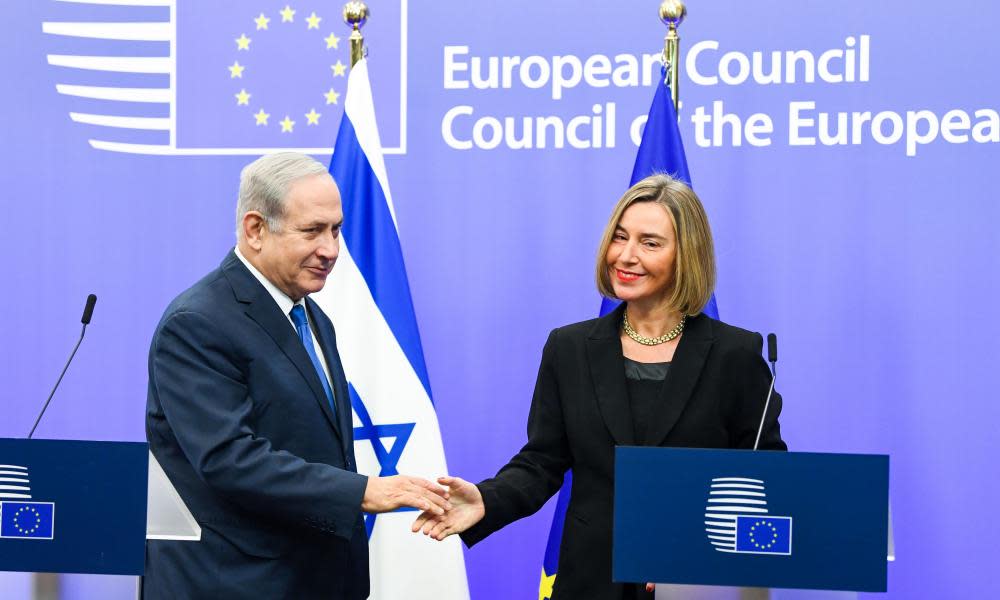European governments refuse to follow Trump on status of Jerusalem

European foreign ministers have strongly rejected calls by Israel’s prime minister, Benjamin Netanyahu, to follow Donald Trump’s example and recognise Jerusalem as Israel’s capital.
Opposition from across the European spectrum came as Netanyahu made the first official trip to the EU by a sitting Israeli premier in 22 years.
Even the Czech Republic, one of Israel’s closest allies, warned that the US president’s decision was bad for peace efforts, while France said Jerusalem’s status could be agreed only in a final deal between Israelis and Palestinians.
Netanyahu called on European governments to back a much-mooted US peace initiative despite the fact that Trump has yet to reveal any details about it.
Making clear that the EU would not write a blank cheque for an unseen Trump peace plan, France’s foreign minister, Jean-Yves Le Drian, urged Washington to disclose what was being drawn up by Jason Greenblatt, Trump’s Middle East envoy, and Jared Kushner, Trump’s son-in-law and senior adviser.
“We’ve been waiting already for several months for the American initiative, and if one is not forthcoming then the European Union will have to take the initiative,” Le Drian warned.
Arriving for a meeting of EU foreign ministers in Brussels, Netanyahu said Trump’s move made peace in the Middle East possible “because recognising reality is the substance of peace, the foundation of peace”. He said all, or most, European countries would move their embassies to Jerusalem and recognise it as Israel’s capital, though there is no evidence that any European country is preparing to do so.
“I have a hard time seeing that any other country would do that and I don’t think any other EU country will do it,” Sweden’s top diplomat, Margot Wallstrom, told reporters after the meeting.
The EU foreign policy chief, Federica Mogherini, reiterated the bloc’s commitment to a two-state solution, telling Netanyahu that it would continue to recognise the “international consensus” on Jerusalem. The EU would increase its peace efforts and hold talks with the Palestinian president, Mahmoud Abbas, next month, she added.
Palestinian officials have called on Europe to take a greater role in the moribund peace process after the US president’s move, which sparked protests across the Middle East and accusations that the US had abdicated its role as an “honest” mediator.
Abbas travelled to Istanbul and Cairo to meet Egypt’s president, Abdel Fatah al-Sisi and the Turkish president, Tayyip Recep Erdoğan, to rally support ahead of an emergency summit of the Organisation of Islamic Co-operation in Turkey this week.
Palestinians are calling on the 57-member OIC – which will convene on Wednesday – to make its own recognition of Jerusalem as the Palestinian capital.
Arab states last week condemned Trump’s Jerusalem decision and vowed to press international bodies to take action against it, without announcing any concrete measures.
The peace process has been at death’s door since the former secretary of state John Kerry’s peace mission ended in failure in 2014. But the international community – apart from the US – is united in saying recognition of Jerusalem as the capital of Israel is disastrous for any hopes of reviving meaningful talks. The status of Jerusalem is one of the pivotal issues that diplomats and peacemakers have said must be agreed between the two parties in negotiations.
Palestinians will see Trump’s announcement as the end of their hopes and demands for East Jerusalem as a capital of a future independent state. While few want a return to violence, many will feel diplomatic efforts have got them no closer to a state of their own.
The Israeli government will be thrilled. Ever since it captured (and later annexed) East Jerusalem in the 1967 six-day war, Israel has claimed the city as its “eternal and undivided” capital, and has longed for international recognition. Some 200,000 Israelis living in illegal settlements will also celebrate.
In Germany, there has been widespread condemnation of anti-Israel protests over the weekend that included chants of “Death to Israel” and incidents where protesters set light to Israeli flags and ignited yellow Stars of David.
“We condemn all kinds of antisemitism and xenophobia, and no disagreements, not even over the status of Jerusalem, justify such actions,” the chancellor, Angela Merkel, said on Monday
US diplomats, meanwhile, have continued to try to contain the damage caused by Trump’s decision, which upended years of both US diplomacy and the international legal consensus.
Asked in a telephone briefing with Gulf-based journalists about whether the president would change his mind, David Satterfield, assistant secretary for the Bureau of Near Eastern Affairs, said no. He stressed, however, that the developments of the past week did not prejudge the issue of final borders.
“The president’s decision stands,” Satterfield said. “It is, as I said, what the president believes was the right step, at the right moment. The president also said that these measures in no way prejudice the outcome of final status negotiation between Israel and the Palestinians.”
Additional reporting by Kate Connolly in Berlin

 Yahoo News
Yahoo News 
